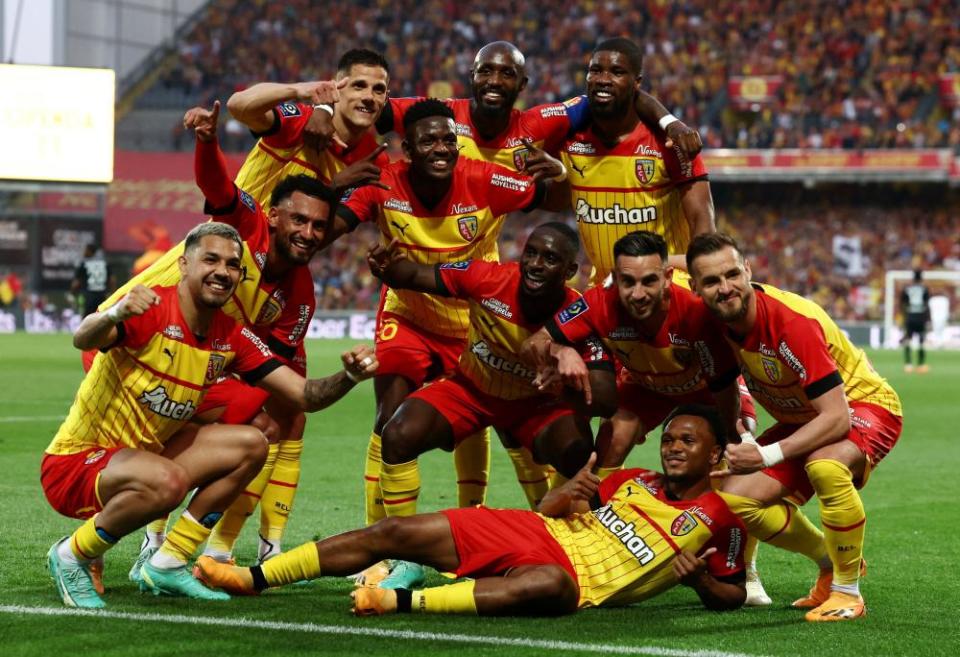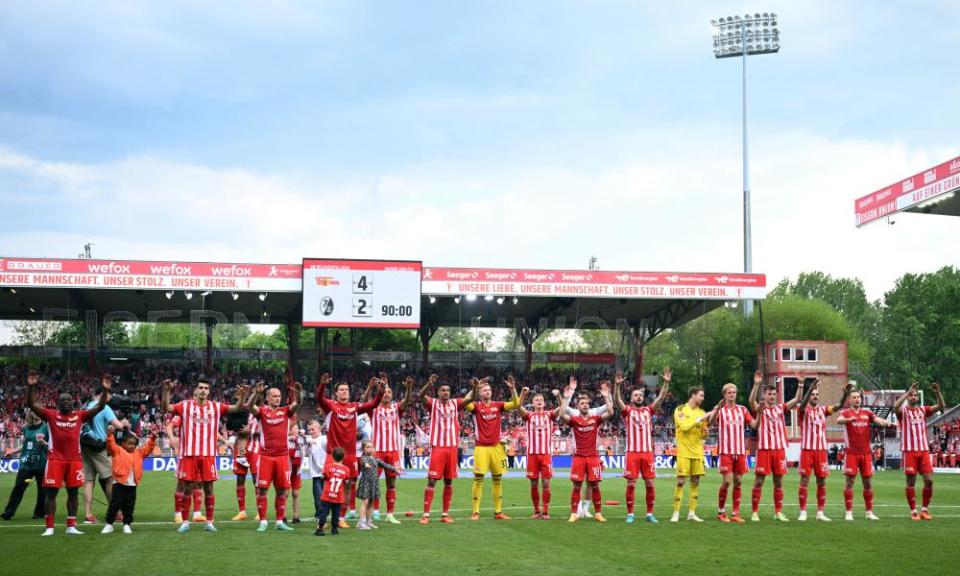Newcastle, Union and co will refresh Champions League next season
When the confetti cannons have been silenced, the celebratory pyrotechnics extinguished and the presentation podium dismantled after Saturday night’s Champions League final, tournament organisers at Uefa HQ will have little or no time to catch the collective breath.
On Tuesday, after a run-through of the byzantine rules of qualification, the glass bowls and mini screw-top plastic footballs so synonymous with Champions League draws will be dusted off and pressed into service in Nyon. The qualifying rounds of next season’s competition are scheduled to kick off later this month and, less than 72 hours after the trophy lift in Istanbul, the four teams in the preliminary round will be paired.
Setting out on the first tentative steps towards qualification for the group stages in the 69th season of Europe’s most elite football tournament, representatives from Iceland, Andorra, Montenegro and San Marino will duke it out for the one remaining place left in the first qualifying round.
Related: West Ham target Ajax midfielder Edson Álvarez to replace Declan Rice
In the preposterously unlikely event that one of Breidablik, Atlètic Club d’Escaldes, Buducnost Podgorica or Tre Penne eventually make it to the final 32, the successful minnows will already have played 10 matches in the competition by the time the group stages kick off in September.
Next season’s Champions League, whose final is due to be played at Wembley next June, will be the last one in which the current format of 32 teams competing in eight groups of four is employed. From 2024-25 the tournament will be expanded to a more bloated Swiss-style system: all clubs will play an extra two group fixtures and room will have to be made in an already hectic football schedule for an additional 100 games on top of the current total of 125.
“More and more games, is no one thinking about us players?” mused Manchester City’s heartwarmingly naive captain, Ilkay Gündogan, when this latest Uefa wheeze was first announced. “The new UCL format is just the lesser of the two evils in comparison to the Super League.”
For now at least, it’s business as usual, with 26 of the 32 group stage places filled for next season’s competition, and there are already several eye-catching gatecrashers rubbing shoulders with the usual suspects among Europe’s traditional old guard.
Given the bottomless reservoir of wealth they can call upon under their sportswashing Saudi owners, there was a certain inevitability about Newcastle United’s return to the top table of European football’s elite but few expected Eddie Howe’s side to be pulling up a chair and tucking in after their first full season as a club owned by a nation state. By significantly improving many of the players he inherited and successfully integrating largely impressive new recruits brought in at a cost of more than £250m since taking the job in November 2021, Howe has defied the expectations of even his club’s owners and fans to catapult Newcastle up the table and achieve a top-four finish.
With Champions League football to contend with next season he has made it clear that a summer trolley dash will be required to significantly strengthen his squad for the additional rigours ahead. If he and the club’s recruitment department can maintain their commendable policy of extravagant but shrewd spending, there is every chance Newcastle could go deep into next season’s competition.
While the presence of Barcelona, Real Madrid, Atlético Madrid and the serial Europa League winners, Sevilla, in the group stages is to be expected, this year’s surprise Spanish package is Real Sociedad. Back in the Champions League after a 10-year absence, the Basque club finished a comfortable fourth place in La Liga, a feat pulled off due in no small part to the contribution of the evergreen David Silva.

The 37-year-old recently signed up for another year at the Estadio de Anoeta and would surely relish the prospect of coming up against his former club Manchester City, with whom he won 11 major honours over 10 seasons after his 2010 move from Valencia.
Meanwhile in France, Lens have qualified for the Champions League for only the third time in their history, having last graced the group stages two decades ago. After a 15-year period spent yo-yoing between France’s top two tiers, the club achieved stability following a takeover by the financier Joseph Oughourlian and have been steadily improving Ligue 1 staples for the past three seasons.
Managed by Franck Haise, Lens are a selling club with few, if any, big-name players; the polar opposite of the big-spending perennial Champions League failures Paris Saint-Germain. To nobody’s great surprise the Qatari-owned super club won the French title, but they were forced to work for it until the last day of the season. They finished just a point ahead of the outsiders from the country’s northern industrial heartland.

As undeniably impressive an achievement as theirs was, in terms of romance Lens have been left holding the Hefeweizen beer of Union Berlin. A second division side in Germany as recently as four years ago, the club had never played in the Bundesliga until 2019, when their maiden promotion was masterminded by their Swiss manager, Urs Fischer.
More recently, Union secured Champions League qualification for the first time in their history with a 1-0 win over Werder Bremen on a final day of the season when their achievement was rather eclipsed by Borussia Dortmund’s more spectacular choke. Having already played in Uefa’s second and third-tier competitions in recent seasons, the new hipsters’ favourites from the south-eastern corner of Germany’s capital have precious recent European experience to call upon.
Due to a shortage of seating at their 22,012-capacity Stadion An der Alten Försterei, a largely terraced ground rebuilt in 2009 by hundreds of volunteers from among their own fanbase, Union may be forced to play their Champions League home games at the city’s Olympiastadion.
While switching grounds to that of their bitter rivals Hertha Berlin would generate millions more in revenue for Union, their president, Dirk Zingler, has made it clear the club would rather not be forced to uproot. “If possible, we will play here,” he said. “We should also be grateful that there is a five-star stadium owned by the city that we could move to.”

Elsewhere in the group stages, Red Star Belgrade have become the first Serbian team to qualify automatically for the group stages, benefiting from the ban imposed upon Russian teams for the illegal invasion of Ukraine, whose flag-bearers, Shakhtar Donetsk, advance straight into the group stage draw because both this season’s finalists had already qualified via their domestic leagues.
In the qualifying rounds there are several eye-catching if little-known clubs set to do battle to join them. Rakow Czestochowa won their maiden Polish title and get their campaign under way in the first round of qualifying along with the Latvian champions, Valmiera, a club noted for their shrewd dealings in the African and Latin American markets.
Related: Jude Bellingham is 19 years old but ready to be Real Madrid’s everything | Sid Lowe
Without a representative in the group stages since Malmö came through four rounds of qualifiers in 2021, Sweden will be represented by Hacken, who will have to emulate the feat of their compatriots if they are to rub shoulders with the good and the great.
Already guaranteed a playoff place, the Belgian champions, Royal Antwerp, are another side to watch after the final-day heroics in which the former Tottenham defender Toby Alderweireld went viral courtesy of the long-range screamer that snatched a first title in 66 years for his boyhood club in the dying seconds of the season.
Closer to home, Northern Ireland’s champions, Larne, their southern counterparts, Shamrock Rovers, and the Welsh title holders, the New Saints, will all take their places in the first qualifying round but are unlikely to qualify for anything more prestigious than the Europa Conference League at best.
While managerless Celtic’s place in the group stages is already booked, the Scottish runners-up, Rangers, are in the third qualifying round of the Champions League and will have to beat two as yet unknown teams if they are to join their bitter rivals in competition proper.

